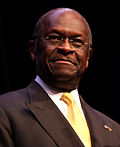9–9–9 Plan
The "centerpiece" [15] of Cain's presidential campaign introduced in August 2011 had been the "9–9–9 plan", [16] which would replace all current taxes (including the payroll tax, capital gains tax, and the estate tax) with 9% business transaction tax; 9% personal income tax rate, and a 9% federal sales tax. According to Cain, corporations would be able to deduct costs of goods sold (provided the inputs were made in America) and capital expenditures, but not wages, salaries and benefits to employees. [17] Deductions, except charitable giving, would be eliminated. The federal sales tax would not apply to used goods. Cain also said that the 9–9–9 Plan would lift a $430 billion dead-weight burden on the economy. [18]
Cain stated the following summary about the 9–9–9 Plan:
Our current economic crisis calls for bold action to truly stimulate the economy and Renew America back to its greatness. The 9–9–9 Plan gets Washington D.C. out of the business of picking winners and losers, using the tax code to dole out favored, and dividing the country with class warfare. It is fair, simple, transparent and efficient. It taxes everything once and nothing twice. It taxes the broadest possible base at the lowest possible rates. It is neutral with respect to savings and consumption, capital and labor, imports and exports and whether companies pay dividends or retain earnings. [18]
According to the analysis of Howard Gleckman the Tax Policy Center,
When you get right down to it, Cain's [9–9–9] plan is a 25 percent flat-rate consumption tax — not all that different from the FAIR tax that he says is his ultimate goal. This tax would be paid three times: first on wage income, again at the cash register as a sales tax, and yet again by businesses on their sales minus their cost of goods and services. For tax junkies, the first is a flat tax. The second is a retail sales tax and the third a business transfer tax. But they are all consumption taxes. [19]
Although Cain had spoken about having designated 'empowerment zones' [20] wherein a lower percentage, such as 3%, is paid instead, apart from this consideration, some have called Cain's plan more regressive than current policy, thinking it would raise taxes for most households, but cut them for those with the highest income. [21] [22]
Cain modified the plan for people under poverty level, reducing income tax for the poor to 0%, telling an audience in Detroit October 21 that the poorest Americans would get a "9–0–9" plan. [23]
In an October 18, 2011 debate several of the other contenders for the GOP nomination attacked the plan, with candidate Rick Santorum referencing the Tax Policy Center's claim that 84% [24] of Americans would pay more and that the plan would entail "major increases in taxes on people," a charge Cain had denied. [25]
Some economists support the 9–9–9 Plan. The former Reagan Treasury official Gary Robbins stated that the 9–9–9 Plan will expand the GDP by $2 trillion, create 6 million new jobs, increase business investment by 33%, and increase wages by 10%. [26] Also, Art Laffer, a famous supply-side economist, told HUMAN EVENTS that "Herman Cain's 9–9–9 plan would be a vast improvement over the current tax system and boom the U.S. economy.". [27]
Conversely, other economists feel that the 9–9–9 plan would not stimulate the demand. [28] Bruce Bartlett of the Reagan and George H.W. Bush administrations had written that Cain's plan "would increase the budget deficit without doing anything to stimulate demand". [28]
The Economist criticized the 9–9–9 Plan stating that the Cain plan is not a reduction in the current corporate tax, but instead a new value added tax (VAT). The article also stated that Cain's final tax would be a 30% VAT, as compared to the 15% European Union value added tax. [29] The Cain plan would change the 35% corporate tax to a 9% transaction tax, which would be flat except for payroll deductions for employees in empowerment zones. [30]
Cain said the following about the 9% sales tax.
Unlike a state sales tax, which is an add-on tax that increases the price of goods and services, this is a replacement tax. It replaces taxes that are already embedded in selling prices. By replacing higher marginal rates in the production process with lower marginal rates, marginal production costs actually decline, which will lead to prices being the same or lower, not higher. [31]


